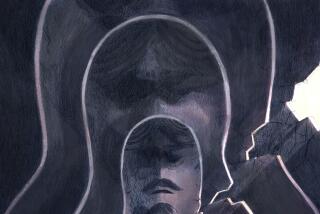A FATHER’S WORDS by Richard Stern (Arbor House: $14.95; 171 pp.)
- Share via
Richard Stern has been writing crafty fiction for a quarter of a century, and he knows his apples about the voices of educated Americans who have come up, Augie March-like, from down there. The narrator of “A Father’s Words,” Cyrus (Cy) Riemer, editor of a Chicago science newsletter, no kin at all to that grim reaper of a Cyrus (Chicago Tribune) McCormick, is the son and grandson of a butcher. “Once my father heard me spell Mississippi , I was his little genius. He wasn’t going to let this little arm cut pork chops.”
The narrator’s mother had a hard, shrewd eye: “I’ve had your number from Day One.” Indictment is the “household sport.” Family is this novel’s subject, and particularly the idiom of a particular family, particularly American: “Riemers are athletes of the mouth.” Wisecracking wisdom, Cy Riemer remarks that “Tolstoy’s wrong about happy families.” Was he ever wrong! What could be more peculiar, more singular, more remarkable than a happy family?
Alas for the Riemers and literary novelty, this is not a happy family, though it often tries to be, and the trying always is interesting. But it seems that the energy of a novel comes from friction rather than from the sun, that oppositions almost inevitably provoke its motions and noises. Clash is surely the fuel by which this novel runs.
“A Father’s Words” are uttered to four children, and most potently and cruelly to a son, Jack, a relentless failure. “All I know,” the father says, knowing much more, “is I can’t tolerate the way he acts and looks. After all, he’s mine. I helped shape him. His life’s a rebuke to mine.”
Those are not my words or Richard Stern’s; they belong to Cy Riemer, yet knowing this, I find them as painful to type now as to read then. The pain is the fruit of Stern’s masterful calculation of an offhanded grammar for a cataclysmic repudiation. Not far into “A Father’s Words,” Riemer talks to his son, delicately knocking Jack off balance with light jabs almost dreamily delivered, deflating the boy’s (perhaps) ill-considered enthusiasms: “After I rock him back and forth like this, I hate myself.”
The very rock is the crusher, pulling from some distant channel the blurry memory of a child rocked for comfort in a father’s arms. Not that Jack isn’t a royal pain, a slippery customer, not at all sound as a penny. He lives an indolent and too easily examined life, supine on davenports or running up other citizens’ telephone bills. He is like the narrator of Frederick Exley’s “Fan’s Notes,” without that audacious screw-up’s wit or punishing reflection.
Still, Cy Riemer’s disapproval of Jack is out of all ratio to the offenses that putatively provoke it. His other three children see this, as Stern and his readers see it, and the delicate manipulation of a smart, sane, self-justifying narrator, who is not the character he wishes his audience to see and believe (“For me, family counted . . .), is not the least of Stern’s achievements in this delicate fabrication of tough prose and tender adjustment of sentiment. (It comes to break a reader’s heart to hear Jack, or Riemer’s daughter Jennifer, call out to this father: “Hi, Dad.”)
And Riemer is not spared self-knowing, even if it seems to be too little and come too late, among the street crowds of New York, to which he has come to heal (and punish) Jack: “Thousands of automobiles, walkers, talkers, sitters, strollers, touchers; trillions of words, a hundred thousand jokes; a hundred thousand stories, come-ons, come-offs, getting found, getting lost . . . I stank of disharmony. If the galaxy had turned into a microscope, I would have been the perfect specimen of Out-of-Place.”
As Tolstoy said, right on the button in the second half of his formulation, unhappy families are indeed unhappy each in its own way. So isn’t everyone, after all, “Out-of-Place”? And isn’t that the saddest damned thing? Except that it’s a fact that makes novels as good as “A Father’s Words.”
More to Read
Sign up for our Book Club newsletter
Get the latest news, events and more from the Los Angeles Times Book Club, and help us get L.A. reading and talking.
You may occasionally receive promotional content from the Los Angeles Times.










